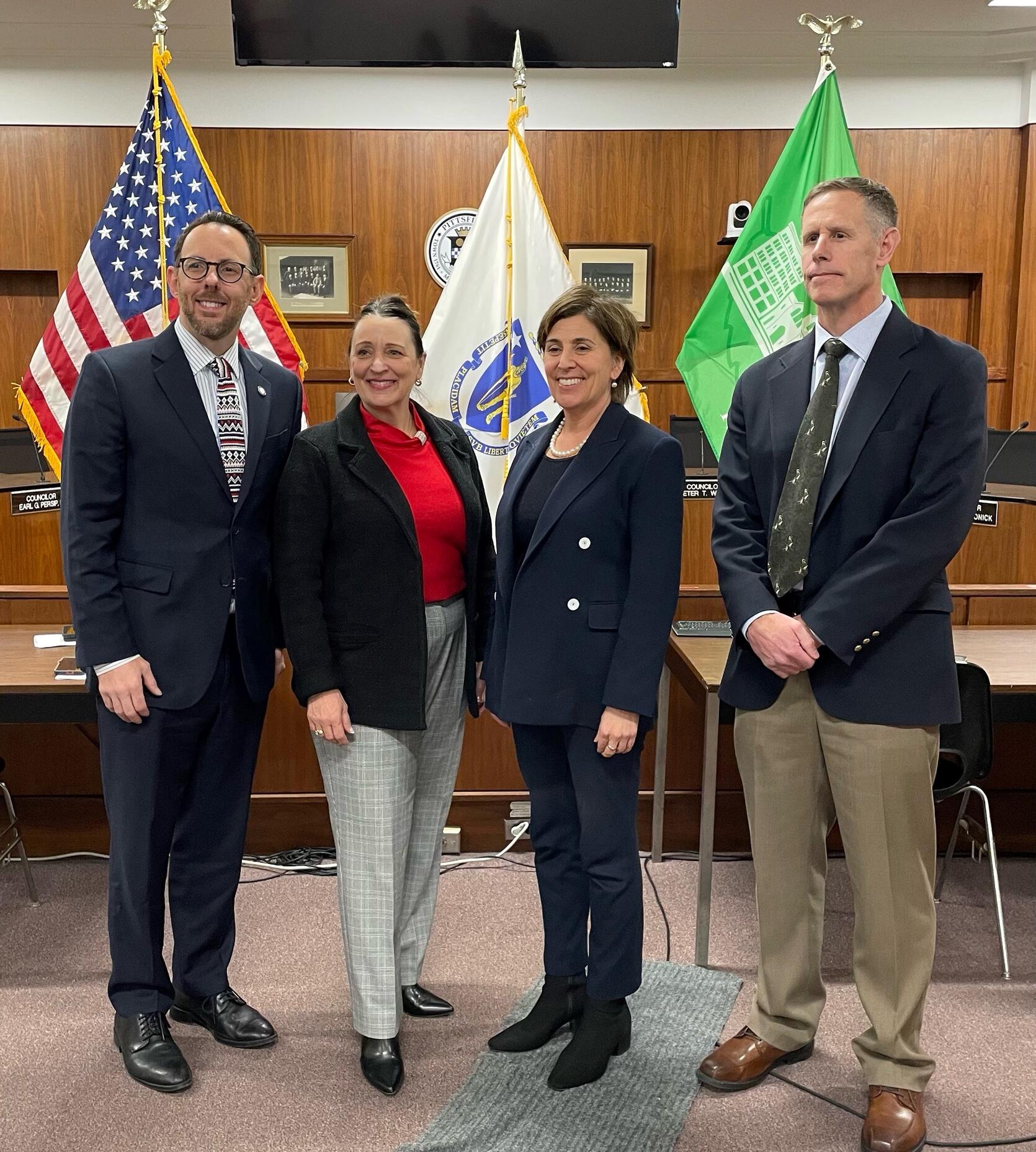- Executive Office of Energy and Environmental Affairs
- Department of Conservation & Recreation
- Department of Fish and Game
- Division of Fisheries and Wildlife
Media Contact
Danielle Burney, Deputy Communications Director

Pittsfield — The Healey-Driscoll Administration today announced an investment of $25 million to remove eight aging dams in Central and Western Massachusetts, including the abandoned high-hazard Bel Air Dam in Pittsfield. Energy and Environmental Affairs (EEA) Secretary Rebecca Tepper, Department of Conservation and Recreation (DCR) Commissioner Brian Arrigo, Department of Fish and Game (DFG) Commissioner Tom O’Shea and Director of the DCR Office of Dam Safety (ODS) Bill Salomaa joined Pittsfield Mayor Linda Tyer in Pittsfield today to make the announcement. Removing these hazardous and aging dams will restore fish and other wildlife habitat, increase biodiversity, improve water quality, promote climate resiliency, and make communities safer.
“This summer, we saw firsthand the catastrophic impacts of severe flooding and the stress and pressure it puts on our dams. Our administration recognizes the severe threats these dams pose to our cities and towns, and we are taking swift action to remove these obsolete structures,” said Governor Maura Healey. “This is a lifesaving investment that will protect our residents’ and communities’ safety and security.”
“Communities face significant financial burdens in removing or repairing dams. We are proud to support municipalities with this funding and ease the strain on their local budgets,” said Lieutenant Governor Kim Driscoll. “Through continued partnership, we are helping cities and towns do the critical work to proactively prepare for future weather events.”
The projects are funded through the American Rescue Plan Act (ARPA). Of the $25 million, $20 million will support the removal of Bel Air Dam, and $5 million will go toward the removal of seven dams located in areas managed by DFG’s Division of Fisheries and Wildlife’s (MassWildlife) in Athol, Sutton, Brookfield, Hardwick, Windsor, and New Braintree.
“Removing old and aging dams is an important priority for our administration. This year’s damaging storms emphasized that we have to move with urgency,” said EEA Secretary Rebecca Tepper. “As we continue to experience more frequent severe weather events, it is vital that we address the infrastructure that is most impacted. We are putting this money to work to make our communities more resilient to climate change.”
As part of Massachusetts’ statewide emergency and resilience planning, DCR and DFG are working closely to examine the safety of the state’s dams for repair or removal based on expected precipitation as the climate crisis brings more extreme rain and flooding.
“With the extreme rainfall this year, we have seen firsthand how important a well-functioning dam system is for the safety of our communities and preservation of our natural resources,” said DCR Commissioner Brian Arrigo. “For over a decade DCR has dedicated resources to maintaining Bel Air Dam. This funding to remove the hazardous dam will ensure that we can protect the downstream community, restore the natural environment, and enable us to rededicate our resources to ensuring other dam infrastructure is in good condition.”
“The Department of Fish and Game has a special responsibility to be stewards of our rivers and streams for the fish and wildlife that depend on them,” said DFG Commissioner Tom O’Shea. “Dam removal is greatly beneficial to wildlife and one of the keys to improving native biodiversity.”
“During my administration, we have developed great partners at all levels of government. The Bel Air Dam removal project is another example of what we have been able to accomplish when we are all working towards the same goal. I am grateful for the continued support of the Healey-Driscoll administration as we make improvements to environmental quality throughout Pittsfield,” said Mayor Linda M. Tyer.
ODS maintains records of dams located, state-wide, ensuring compliance with regulations pertaining to dam inspections, maintenance, operation, and repairs. All jurisdictional-dam owners are responsible for registering their dams, notifying ODS of a property transfer, and inspecting and maintaining them in safe operating condition. In the case of High and Significant hazard potential dams, owners are also required to develop an emergency action plan (EAP), which can be used if there is an incident of failure, overtopping, or damage to a dam.
For more than ten years, ODS has conducted periodic inspections, maintenance, and repairs of Bel Air Dam, a priority abandoned High Hazard dam. The removal of the Bel Air Dam will reduce the risk of downstream flooding related to the dam’s failure. The potential flooding would affect nearly 500 parcels of land, including residential, business, commercial, and industrial areas located within the low-income community downstream, as well as impact five bridges in the inundation area. A dam failure could potentially cause loss of life and substantial damage to buildings, roadways, and other infrastructure in the city. It could also put the health of the community at risk by exposing them to sediment contaminants, including lead and chromium.
As part of dam removal and site restoration, DCR will manage contaminated sediment accumulated at Bel Air Dam and dispose of sediments off-site to reduce the risk of adverse public health effects in the surrounding community. Additionally, the removal of the Bel Air Dam will improve fish passage and enhance ecological restoration of the west branch of the Housatonic River in Pittsfield, where the dam currently sits.
In 2019, DFG completed an assessment of its dams. The report recommended removing 14 of the 34 DFG-owned dams across the state. Since that report was released, DFG has inspected all dams, created Emergency Action Plans for ten, and removed two DFG-owned dams. The $5 million in ARPA funding will allow an additional seven dams to be removed by June 2026. The removal of these dams will restore waterways to their natural state, improving water quality and aquatic habitats, as well as improving recreation opportunities for visitors to these public lands. The seven dams that will be removed are:
- Cusky Pond Dam, New Braintree
- Schoolhouse Pond Dam, Sutton
- Patrill Hollow Pond Dam, Hardwick
- Thousand Acre Reservoir Dam, Athol
- Arnold Pond Dam, Sutton
- Salmon Pond Dam, Brookfield
- Weston Brook Dam, Windsor
EEA and DFG’s Division of Ecological Restoration (DER), make grant and loan funding available for dam repairs, breaching, or removal under the EEA Dam and Seawall Repair or Removal Program and the DER Priority Projects Program. Since 2014, EEA and DER have awarded $67.7 million in grants and loans to repair or remove dams.
Additionally, there are several other programs within EEA that work to address the state’s dam system. DCR and DFG have also separately invested approximately $7 million annually into their state-owned dams, totaling nearly $30 million since 2019. EEA’s Municipal Vulnerability Preparedness Program (MVP) has also provided $7.3 million to support 19 municipal dam projects.
###


